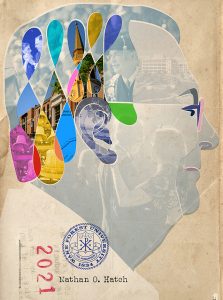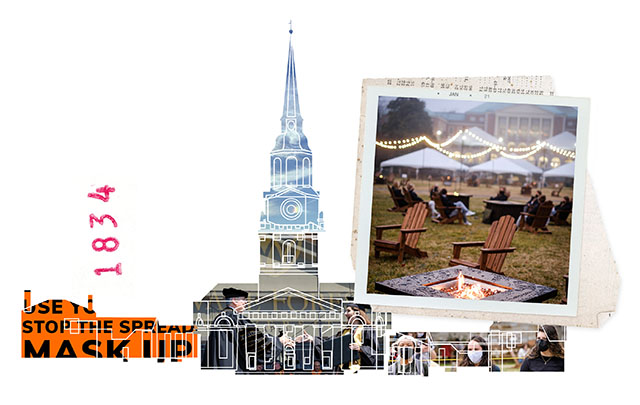As I reflect on the past 15 years at Wake Forest and the last year of stress and urgency caused by the COVID-19 pandemic, I am deeply grateful for all I have learned about working together on really important matters — in good times and bad.
Teamwork has become a signature of Wake Forest. My first example is one close to home. Julie and I came here with a common goal that the purposes of Wake Forest would become our own. I am grateful that, with complementary skills and personalities, she joined faithfully in the effort to make Wake Forest a better, and more distinctive, learning community.
At Wake Forest, teamwork has blossomed in so many quarters. I can think of no major accomplishment that has not been launched by committed teams of Wake Forest faculty, staff, administrators and students. Together, we launched test-optional admissions, the Magnolia Scholars program and the Office of Diversity and Inclusion. Together, we worked to build Wake Downtown and a new engineering program and other efforts in biomedical science. Together, we merged two business schools and put our medical school and hospital under joint management. Together, we renewed our dated residence halls and athletic facilities. In these and many other efforts, teamwork has been a strategic accelerator.
In the last year, the sense of teamwork has manifested itself across the University in unbelievable ways, and I want to share with the entire Wake Forest community the countless ways the on-campus community has amplified the spirit of cooperation and goodwill in the crisis of the pandemic. The reality of COVID-19 in a living community of some 8,000 people such as Wake Forest is that there is not one emergency but a set of ongoing crises. It has been not one tsunami but a roiling sea that every day created waves coming from many directions. The challenges were different and constant: evolving medical advice, challenges to sustain teaching and research, changing state regulations, varying disease outbreaks, variable student response. Every day and every week had new and often unexpected challenges. Teams had to manage a rolling series of crises that involved hundreds of decisions.

Dwight Eisenhower once said that “plans are worthless, but planning is everything.” All across Wake Forest, multiple teams have learned this kind of dynamic planning — understanding that today’s decisions will probably need altering tomorrow; that one has to test how matters are playing out on the ground; that one must calibrate what others are doing and apply best lessons learned. It is this kind of team-based crisis management that has become the standard, with nimble, week-by-week adjustments being made all across the University.
All of this took new forms of organization — and there were no books on the shelf of how to do this. These new structures were deeply cross-functional and broke down many silos on campus — a great lesson to be learned moving forward.
There are many heroes in this chapter of our story — colleagues who went far beyond the call of duty, who had a commitment, deep in their bones, that we simply could not fail. I think of all the adjustments made by the teams in the Office of the Dean of the College and by our department chairs. I think of the burdens placed upon the team in the Office of Residence Life and Housing. I think of all the demands upon the Office of Procurement Services, with the great need to provide testing and procure Personal Protective Equipment material to ensure safety in offices, classrooms and residence halls.
I am deeply indebted to scores of teams across the University and to the Reynolda Cabinet — the finest team I have ever witnessed in higher education. The past months have been enormously stressful and challenging. I have been amazed by the common ability to come together, to trust each other, to work unselfishly, to pitch in wherever needed, to start in one direction and pivot on a dime when conditions changed or when a better idea was presented. I am grateful that people have expected the best of each other. They have not pointed fingers or laid blame in times of great stress.
I am grateful to teams across Wake Forest for their creativity, their gritty resolve and perseverance, their dedication to the welfare of all. Thank you for the optimism — even amidst chaos and criticism — and for the willingness to make firm decisions when only a fraction of the evidence needed was available. Thank you for the willingness to solicit input from others and to communicate broadly and endlessly with all of our stakeholders. We had to reinvent the University, and so many teams have been critical in that process.
The deepest friendships are often forged in the caldron of stress and hardship — and one can see that in sports, in military encounters and in things like political campaign boiler rooms. I have great affection for so many in the Wake Forest community because we have been in the boiler room together and spent hundreds of hours wrestling with complexity and enigmas. All of you have my unfailing respect because together we have done something extremely challenging and really important. As a group, you have manifested something precious and rare: sterling character.
I have been amazed by the common ability to come together, to trust each other, to work unselfishly, to pitch in wherever needed, to start in one direction and pivot on a dime when conditions changed or when a better idea was presented. I am grateful that people have expected the best of each other.
When I think back on these years, I will remember the glistening buildings of Wake Downtown and Farrell Hall and the renewed Reynolds Gym. I will remember new academic programs, the Office of Personal and Career Development, efforts in diversity and a magnificent capital campaign. I will remember the Atrium deal, which takes academic medicine from something at risk to a long-term position of strength. I will remember new athletic facilities and exulting in some great athletic wins — while forgetting the losses.
But what I will remember most about these years is what teams at Wake Forest have achieved since March of 2020. Yours is a great gift to all of Wake Forest, its faculty and staff, its students and alumni, its trustees and friends. Your concerted effort in the midst of the storm is something long to be remembered and cherished.
And there is something very Wake Forest about that. If we really are about Pro Humanitate, for the flourishing of people, then holding this learning community together under stress and pointing it forward is the greatest gift we can offer. Thank you from the bottom of my heart.


